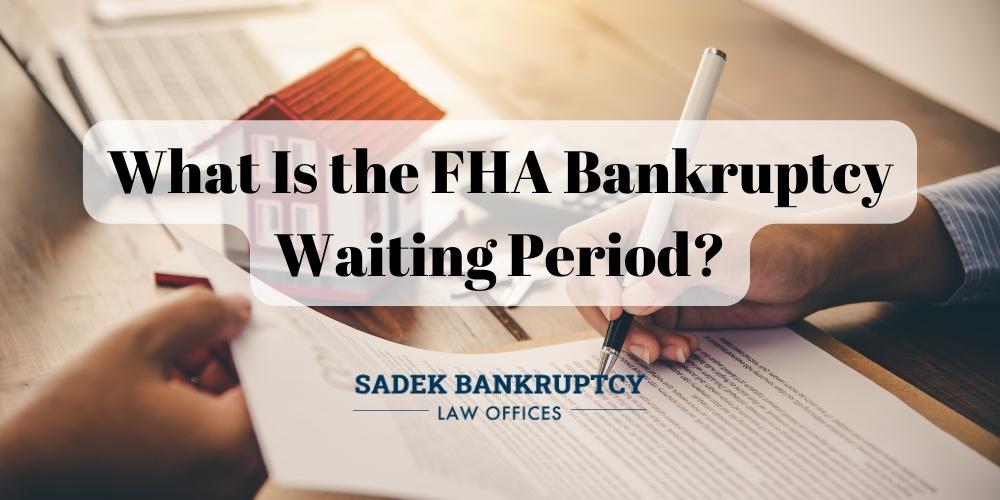Bankruptcy and FHA Loans: What You Need to Know
An FHA loan is a mortgage loan that is insured by the Federal Housing Administration. It gives first-time buyers and other borrowers a chance to buy a home with more lenient terms. However, as with many financial decisions, getting an FHA loan can be impacted by filing for bankruptcy. The FHA bankruptcy waiting period is important to know if you have recently filed for bankruptcy and plan to seek out an FHA loan.
At Sadek Law, our Philadelphia bankruptcy lawyers understand that our plans don’t always go how we want. If you’ve filed for bankruptcy and you’re struggling to get a conventional loan, an FHA loan may be a better option for you. We’re here to offer sound financial and legal advice as you navigate the complexities of post-bankruptcy filing. To schedule a free consultation about your case, please call our office at 215-545-0008 today.
What Is an FHA Loan?
An FHA loan, backed by the Federal Housing Administration, is a mortgage option designed to make homeownership more accessible. This is particularly true for first-time buyers or those with less-than-perfect credit scores. Unlike conventional loans, FHA loans typically require lower down payments and have more lenient credit score requirements. This makes them attractive to a broader range of borrowers. FHA-approved lenders issue these loans and offer various benefits, including competitive interest rates and the ability to finance the purchase of a primary residence with a down payment as low as 3.5%.
FHA Loan Requirements
In 2024, the requirements to qualify for an FHA loan are as follows.
- A FICO credit report score of at least 580, which requires a 3.5% down payment
- A FICO score between 500 and 579, which requires a 10% down payment
- MIP (Mortgage Insurance Premium)
- A debt-to-income ratio of under 43%
- Steady income and proof of employment
- The home must be the loan borrower’s primary residence
How Long After Bankruptcy Can I Get an FHA Loan?
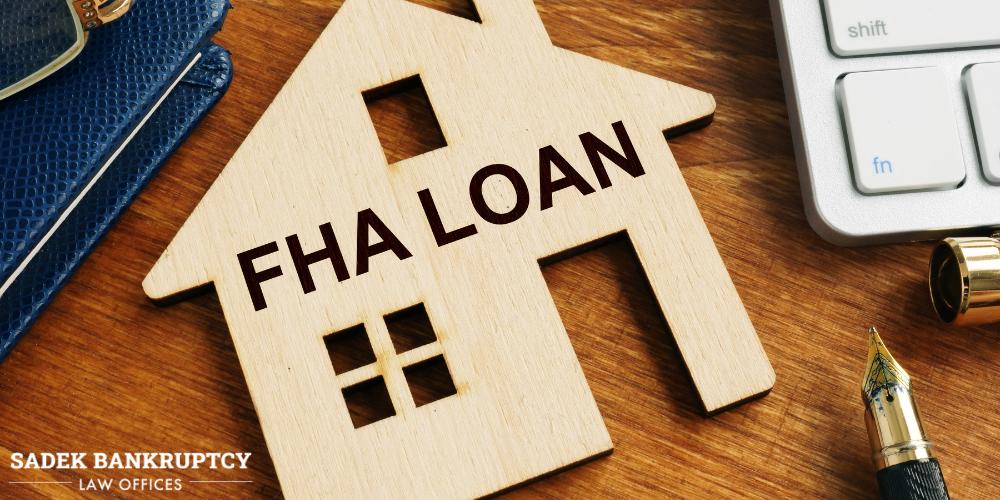
The waiting period to qualify for an FHA loan after bankruptcy varies depending on the type of bankruptcy filed and the circumstances surrounding it. Generally, for Chapter 7 bankruptcy, borrowers must wait at least two years from the discharge date before being eligible for an FHA loan.
For Chapter 13 bankruptcy, borrowers may qualify for an FHA loan while still in the repayment plan, provided they have made satisfactory payments for at least one year and receive approval from the bankruptcy court.
How Long Does It Take to Get an FHA Loan?
The timeline for getting an FHA-insured mortgage loan can vary depending on several factors, including the lender’s processing time, the complexity of your financial situation, and the current market conditions. Typically, the process of obtaining an FHA loan involves several steps, including pre-qualification, application submission, documentation review, appraisal, underwriting, and final approval.
On average, it can take anywhere from 30 to 45 days from the time you submit your application to the closing date. However, this timeline can be shorter or longer depending on various factors. Working closely with a reputable lender and promptly providing all requested documentation can help expedite the process. Additionally, market conditions and lender workload may also influence the overall timeline.
How Long After Chapter 7 Can I Get an FHA Loan?
After filing for Chapter 7 bankruptcy, the waiting period to qualify for a new FHA loan typically spans two years from the discharge date. However, there may be exceptions under certain circumstances. If you can demonstrate that the bankruptcy occurred due to extenuating circumstances beyond your control, such as medical issues or job loss, you may be eligible for an FHA loan after just one year from the discharge date.
These exceptions require documented proof and approval from the Federal Housing Administration. It’s crucial to consult with a knowledgeable attorney to understand the specific requirements and options available to you based on your unique financial situation.
Can I Get an FHA Loan 1 Year After Chapter 7?
Yes, it’s possible to qualify for an FHA home mortgage loan one year after filing for Chapter 7 bankruptcy under certain circumstances. The Federal Housing Administration (FHA) allows for an exception to the standard two-year waiting period if you can demonstrate that the bankruptcy was caused by extenuating circumstances beyond your control, such as a serious illness, job loss, or other significant financial setbacks.
You would need to provide documented proof of these extenuating circumstances and receive approval from the FHA. Remember that these exceptions are granted on a case-by-case basis, and it’s essential to work closely with a knowledgeable Philadelphia Chapter 7 lawyer to navigate the process effectively.
FHA Chapter 13 Guidelines
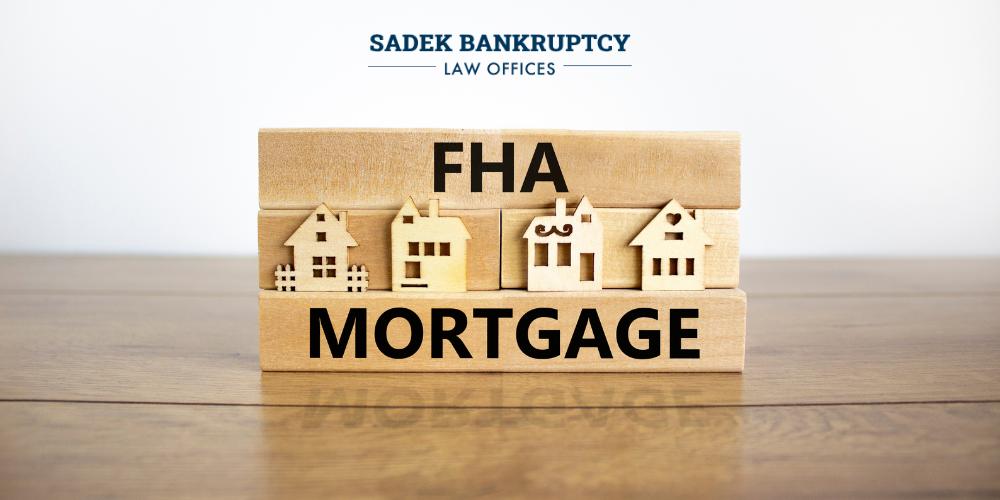
There are specific FHA guidelines for individuals who have filed for Chapter 13 bankruptcy and seek to obtain an FHA loan. One of the key considerations is the timing of the loan application relative to the Chapter 13 bankruptcy proceedings. Unlike Chapter 7 bankruptcy, where borrowers typically must wait for a specified period before qualifying for an FHA loan, those in Chapter 13 repayment plans may be eligible for an FHA loan while still in the plan, provided they meet certain requirements.
To be eligible for an FHA loan during a Chapter 13 repayment plan, borrowers must demonstrate a satisfactory payment history within the plan. This typically involves making on-time payments to creditors as outlined in the court-approved repayment plan. Lenders will assess the borrower’s adherence to the repayment plan and evaluate their overall financial stability and ability to take on additional debt, such as a mortgage.
Additionally, borrowers must obtain written approval from the bankruptcy court to enter into a mortgage transaction while in Chapter 13 bankruptcy. This approval ensures that the mortgage does not interfere with the repayment plan and is in the borrower’s best interest. The court may review factors such as the borrower’s financial situation, the terms of the proposed mortgage, and any potential impact on the Chapter 13 plan before granting approval.
Documentation plays a crucial role in the FHA loan application process for borrowers in Chapter 13 bankruptcy. They must provide documentation of their Chapter 13 bankruptcy filing, including the repayment plan approved by the court. Additionally, proof of court approval for the FHA loan transaction is necessary. Lenders may also require documentation of the borrower’s payment history within the Chapter 13 plan and evidence of financial stability.
What Is the FHA Chapter 13 Waiting Period?
Typically, borrowers must wait for at least one year of making satisfactory payments in the Chapter 13 repayment plan before being eligible for an FHA loan. Additionally, borrowers must obtain written approval from the bankruptcy court to enter into a mortgage transaction while in Chapter 13 bankruptcy. This waiting period allows borrowers to demonstrate financial responsibility and stability to the mortgage lender before taking on additional debt through an FHA loan.
FHA Loan After Chapter 13 Discharge
Generally, you must only wait one year from the date of your Chapter 13 discharge to qualify for an FHA loan. However, you may be able to get an FHA loan while you are still making Chapter 13 payments. You can do this by consistently making on-time payments for a full year and obtaining court approval for the loan. This is another way in which FHA loans are easier to qualify for than conventional loans.
FHA Waiting Period After Chapter 13 Dismissal
If your Chapter 13 case is dismissed, you must wait two years before you can qualify for an FHA loan. This two-year period allows borrowers to re-establish their credit. Despite this two-year period being an extension due to the case’s dismissal, it is still a shorter waiting period than one would have for a conventional loan.
What Are Exceptions to the FHA Bankruptcy Waiting Period?
Exceptions to the FHA bankruptcy waiting period may be granted under certain circumstances. These exceptions typically involve demonstrating extenuating circumstances that led to the bankruptcy filing and showing evidence of responsible financial behavior since the bankruptcy discharge.
If the bankruptcy was caused by factors beyond the borrower’s control, such as medical emergencies, job loss, or divorce, the FHA may consider reducing the waiting period. Borrowers must provide documented evidence of these extenuating circumstances.
If borrowers can demonstrate a re-established credit history and responsible financial behavior following the bankruptcy discharge, the FHA may consider granting an exception to the mortgage loans’ waiting period. This includes maintaining timely payments on existing debts and improving credit scores.
In some cases, borrowers may obtain written approval from the bankruptcy court to enter into a mortgage transaction before the standard waiting period expires. This approval demonstrates the borrower’s ability to handle additional debt responsibly.
How Long After Bankruptcy Can I Get a Mortgage?
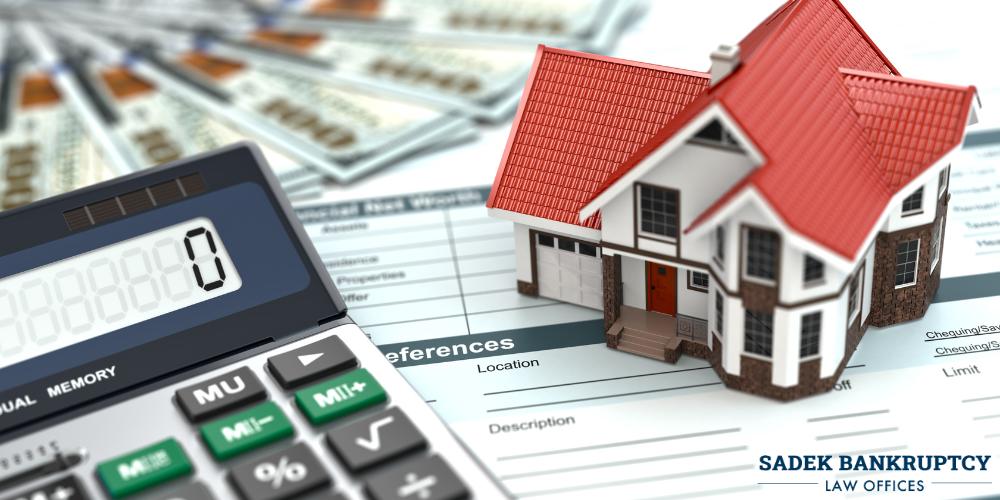
The length of time you must wait to get a mortgage loan after bankruptcy depends on several factors, including the type of bankruptcy filed and the specific requirements of lenders and loan programs.
For Chapter 7 bankruptcy, which involves the discharge of most debts, conventional mortgage lenders typically require a waiting period of two to four years from the discharge date before considering your mortgage application. Government-backed loans like FHA loans and VA loans may have shorter waiting periods, often around two years from the discharge date, with certain exceptions for extenuating circumstances.
Chapter 13 bankruptcy, which involves a repayment plan, may allow borrowers to qualify for a mortgage sooner, even while still in the repayment plan. FHA loans, for instance, may permit borrowers to apply for a mortgage one year into their repayment plan, provided they have made satisfactory payments and received approval from the bankruptcy court.
What Is the FHA Foreclosure Waiting Period?
The FHA foreclosure waiting period refers to the time borrowers must wait after a foreclosure before becoming eligible for an FHA-insured mortgage loan. The waiting period can vary depending on the circumstances surrounding the foreclosure and the borrower’s credit history.
Generally, borrowers who have experienced a foreclosure must wait at least three years before they can qualify for an FHA loan. However, certain exceptions may apply, such as extenuating circumstances like job loss, medical emergencies, or significant reductions in income, which could reduce the waiting period to one year. It’s important to consult with an experienced attorney to understand your rights concerning getting FHA loans after foreclosure.
What Is the FHA Short Sale Waiting Period?
The FHA short sale waiting period refers to the duration borrowers must wait after completing a short sale before becoming eligible for FHA-insured loans. A short sale occurs when a homeowner sells their property for less than the outstanding mortgage balance, with the lender’s approval, to avoid foreclosure.
For borrowers who have completed a short sale, the FHA typically requires a waiting period of three years before they can qualify for a new FHA-insured mortgage loan. However, there may be exceptions to this waiting period under certain circumstances, such as documented extenuating circumstances like job loss, medical emergencies, or other significant financial hardships.
Can You Get an FHA Loan With a Car Repossession?
Yes, it is possible to obtain an FHA loan even if you have experienced a car repossession. However, certain conditions must be met, and approval will depend on various factors, including the circumstances surrounding the repossession and your overall creditworthiness. Having a car repossession on your credit report may affect your ability to qualify for an FHA loan, but it does not necessarily disqualify you outright.
Typically, borrowers who have had a car repossessed must demonstrate that they have reestablished their credit and have a satisfactory payment history since the repossession occurred. Lenders will also consider factors such as your credit score, debt-to-income ratio, and overall credit accounts and financial stability when evaluating your eligibility for an FHA loan.
How to Qualify for an FHA Loan After Bankruptcy
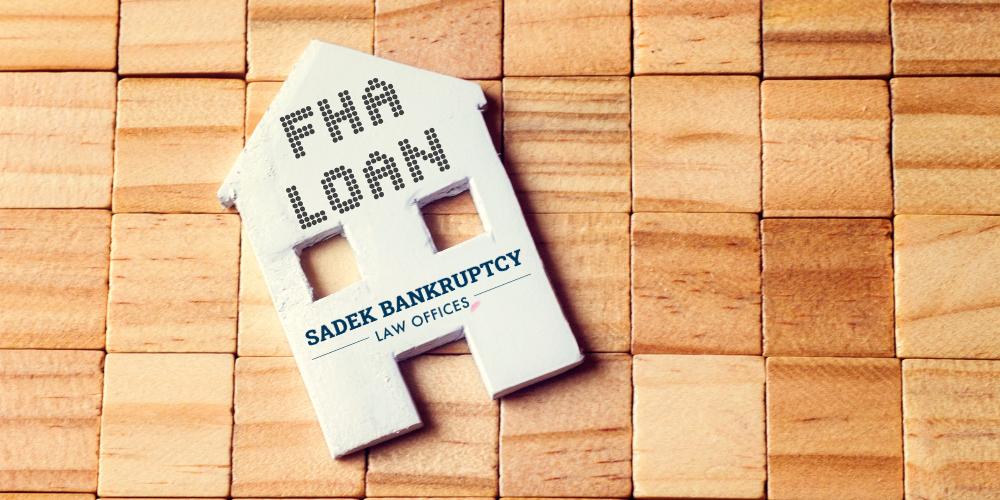
The main requirement for getting an FHA loan after bankruptcy is ensuring that you fulfill the waiting period. You must wait at least two years after getting your Chapter 7 discharge to qualify for an FHA loan. For Chapter 13, borrowers may qualify while they are still in their repayment plan as long as they’ve made satisfactory payments for at least one year and received court approval.
Rebuilding credit is crucial post-bankruptcy. This involves making timely payments on remaining debts like rent and utilities and responsibly managing any credit accounts. Obtaining a secured credit card or becoming an authorized user on another account can help rebuild credit history. Once you have re-established good credit, you’ll have an easier time getting an FHA loan.
Saving for a down payment is also essential. While FHA loans require a lower down payment compared to conventional loans (as low as 3.5%), having a larger down payment can strengthen your application and demonstrate financial stability.
Contact the Philadelphia Bankruptcy Lawyers at Sadek Law Today
Understanding the FHA bankruptcy period is essential for individuals navigating the complexities of bankruptcy and seeking to rebuild their financial lives. Whether you’re exploring options after Chapter 7 or working through a Chapter 13 repayment plan, knowing the FHA’s waiting period requirements and exceptions can empower you to make informed decisions about homeownership and financial planning.
At Sadek Law, we’re dedicated to providing expert guidance and support to individuals facing bankruptcy in Philadelphia. If you have questions about FHA loans, bankruptcy, or any other legal matters, don’t hesitate to reach out. Contact us today for personalized assistance and take the first step towards a brighter financial future.





